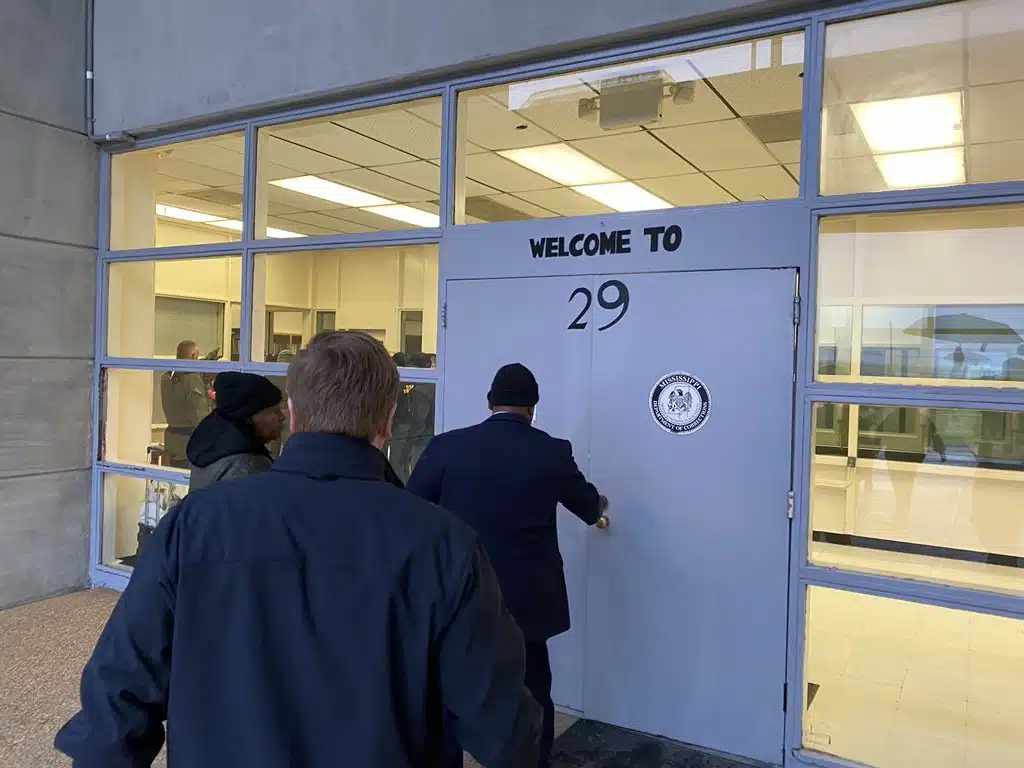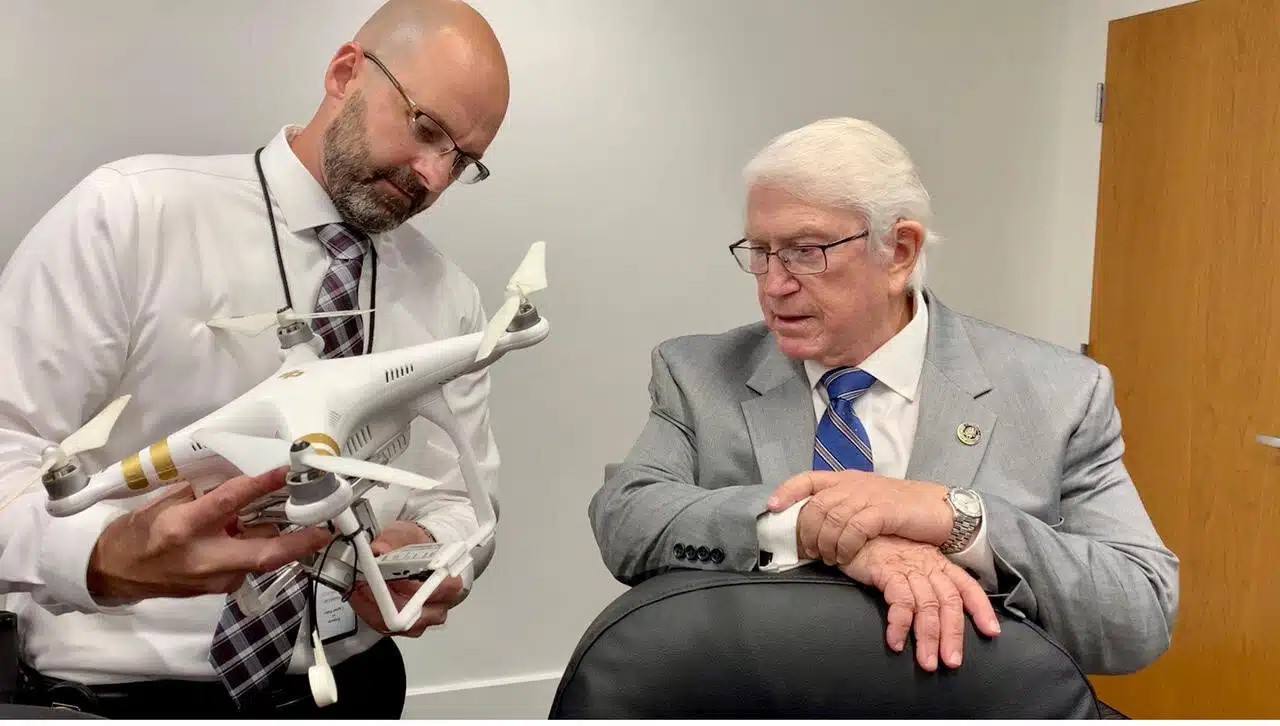Mississippi Today
How Mississippi’s troubled prison system has fared under Tate Reeves and Burl Cain

When Gov. Tate Reeves was sworn into office nearly four years ago, his very first priority was addressing the long-troubled Mississippi prison system.
Deadly riots at the Mississippi State Penitentiary and violence in other state facilities and how state leaders were struggling to address the situation became a major national story. And the Department of Justice had moved in with an investigation into the deplorable conditions and gang violence at four of the prisons.
Reeves, who as governor oversees the Mississippi Department of Corrections, focused on the crisis during his first State of the State address a couple weeks after he was inaugurated.
He vowed in that speech to shut down the worst of the worst, Parchman’s Unit 29, to stem the violence and chaos.
He didn’t.
Today, two-thirds of Unit 29 remains open. The man Reeves put in charge, Burl Cain, said there was no need to shutter the unit and that he could bring it back online through renovations and save the state money.
“I have absolute full confidence in Burl Cain’s ability to change the culture at the Department of Corrections,” Reeves said in May 2020 when he announced Cain’s appointment to oversee the prison system.
“I have absolute confidence he will do so in a manner to make Mississippians proud. I have zero reservations about appointing him,” Reeves said.
The 2020 riots might be over, but the deaths have continued.
Over 300 people have died in Missisisppi’s prisons since Cain became commissioner, with at least 50 of those deaths attributed to homicide, suicide and drug overdoses, according to records between June 2020 and September 2023 from the State Medical Examiner’s Office.
So what has Cain done as commissioner of the Mississippi Department of Corrections?
Mississippi Today, over the past two months, took a deep look at how the long-troubled prison system has fared over the past four years under Cain and Reeves. We interviewed people who are incarcerated, former staff, advocates who have been inside the prisons and state elected officials. We scoured through numerous state documents and reports and federal court filings, submitted open records requests and we spoke with prison officials.
What did we find? Mississippi’s prison system has made some gains, but there is more work to be done.
Incarcerated people still live among crumbling infrastructure. Getting people to work in the prisons continues to be an uphill climb. Gangs continue to hold power over inmates and staff. Efforts to prepare people to return to their communities after incarceration may not be enough.
“Time is short,” Cain said in a September interview with Mississippi Today. “You have four years and we had to rock and roll.”
He was referring to the four-year term of the man who hired him – Reeves. Cain’s name will not appear on any November 2023 state election ballot, but the governor – the person with the ability to keep Cain on the job or dismiss him – is up for a vote. And he’s not running unopposed.
Reeves, in a statement released from his office, said he is grateful for what Cain has been able to accomplish in nearly four years and the commissioner’s ability to solve inherited issues.
Democratic gubernatorial candidate Brandon Presley said in a statement that questions and allegations about Cain’s departure from his previous position in Louisiana give him pause and are why he would look for a different candidate to lead MDOC.
Before coming to Mississippi, Cain, a Louisiana native, was known for reducing violence and incorporating faith into the culture of Angola State Prison, also known as “The Bloodiest Prison in America.”
He had left Angola following questions uncovered in a 2017 audit about his use of corrections staff labor at his private home and receiving benefits for relatives. There were also allegations of his conflicts of interest in business and real estate deals. Throughout the confirmation process, Cain denied the allegations and noted he was not charged with any crime.
Prison violence and other ways to die
Walking into Parchman for the first time, Cain said it reminded him of his first day at Angola.
“It didn’t scare me,” he said.
“It wasn’t something I wasn’t used to, but I knew how to fix it, and that was the advantage I had over other people,” Cain said.
He wanted to prove his work could be replicated. Yet the violence has not abated.

There have been at least eight homicide deaths inside prison facilities during Cain’s tenure – four deaths from blunt force trauma, two stabbings, one from a lung clot and one from thermal injuries, according to records from the State Medical Examiner’s Office.
The data does not include the Sept. 7 stabbing of 23-year-old Raymond Coffey at Parchman, which is believed to be gang-related.
“We’re trying to get home to our families and get people home to their families,” Andrico Pegues, who is incarcerated at the Alcorn County Regional Correctional Facility in Corinth and spent time this year in Parchman’s Unit 29, told Missisisppi Today in a phone call.
More often than not, a majority of inmates die in Mississippi prisons of natural causes. Cancer is the top natural cause of death, according to data from the State Medical Examiner, followed by heart attacks, strokes, lung conditions and liver and kidney diseases.
Disability Rights Mississippi, which has the ability to go inside and investigate the state’s prisons and jails, said it often sees people denied medical and mental health care and accessibility services.
“We’re not seeing really significant improvements on things that incarcerated individuals need,” said Greta Kemp Martin, Disability Rights Mississippi’s litigation director. She is also the Democratic candidate for attorney general.
Disability Rights filed a federal lawsuit in 2021 against MDOC’s medical provider VitalCore Health Strategies and Cain alleging they don’t provide adequate medical and mental health care. The lawsuit is ongoing, and in court records, MDOC and VitalCore have denied the allegations.
MDOC’s COVID-19 response: ‘We made the right decision’
The COVID-19 pandemic has also claimed lives inside Mississippi’s prisons.
At the onset of the pandemic in March 2020, MDOC suspended transfers from all county jails and visitation at all facilities, with exceptions only for attorneys and essential visitors.
By next month, the prison system reported a COVID-19 death: a Parchman inmate with underlying health conditions who had symptoms. The department responded by isolating affected areas, giving close contacts face masks, increasing screening and sanitizing frequently touched areas.
Some family members said officials weren’t doing enough to keep incarcerated people safe.
In May 2020, the Mississippi Center for Justice, MacArthur Justice Center and ACLU of Mississippi filed a class action suit against MDOC for inadequate response to COVID-19 at the Central Mississippi Correctional Facility in Pearl and South Mississippi Correctional Institution in Leakesville. They reached an agreement with MDOC on the grounds the department would implement safety protocols.
By January 2021, MDOC had about 1,380 COVID-19 positive inmates across the system, which Cain noted was better than how other prison systems were faring. He pointed to reporting by The Marshall Project that ranked Mississippi as the 10th safest prison system for only having 21 COVID-19 deaths and 21st for COVID-19 deaths nationwide.
“This is proof that we made the right decision in immediately buying, installing and using sanitization equipment in every area of our prisons as quickly as we could,” Cain said in a 2021 statement. “The temptation had been to wait on thousands of kits to test 17,000 inmates but testing and results would have taken weeks during which the virus could have spread like wildfire.”
SMCI had nearly 400 total COVID-19 cases between early 2020 and June 2022, according to reports released by MDOC online during the pandemic. Next was George/Greene County Correctional Facility with 235 cases, CMCF with 156 cases, Carroll/Montgomery County Regional Correctional Facility with 123 cases and Parchman with 113 total cases.
MDOC’s last online update of confirmed COVID-19 cases is dated June 9, 2022.
Janice Curtis, vice president of Mississippi Dreams Prisoner Advocacy, credited the wardens for taking people to the medical unit or into quarantine if they were exposed to the virus. She also credited Cain for being transparent about the number of active and cumulative cases on MDOC’s website and an effort was made to update the numbers.
The COVID Behind Bars Data Project at UCLA Law School, which tracked cases in state and federal jails, prisons, immigration detention centers and youth facilities, gave Mississippi an F based on how accessible its COVID-19 data was. The project noted that MDOC’s data didn’t include deaths from the virus or count how many staff were infected or died.

The department’s data may not have been the most accurate. Around August 2020 at the private Tallahatchie County Correctional Facility run by CoreCivic, MDOC reported 14 cases even though nearly 150 of the more than 200 Vermont inmates housed there tested positive for the virus when they returned from Mississippi, prompting Vermont prison officials to seek testing for the rest of the state’s inmates in Mississippi.
MDOC began vaccinating people at CMCF in March 2021, one of the first states to do so. Officials said prisoners could decline the vaccine, but documents obtained by Mississippi Today showed refusal could result in loss of privileges, such as visitation and participation in activities.
By September 2021, 89% of the prison population was fully vaccinated.
With inadequate training, ‘you’re going to have chaos’
Perhaps the biggest, and most ongoing challenge, facing Cain at MDOC has been inadequate staffing.
A 2021 report by the Justice Department found that staffing and a lack of supervision threaten the safety of Parchman inmates and staff.
The prison has been operating at half staff since at least 2018, according to the DOJ report. In February 2020, the prison’s overall staffing vacancy was 47% and 52.9% specifically for correctional officers.
Understaffing exists across the prison system. About two-thirds of the authorized security positions are filled at CMCF and about 70% at SMCI, according to MDOC’s 2021 annual report, the most recent available.
How well-trained staff is adds to the already untenable situation.
“If you don’t train the correctional officers to do and know the job, you’re going to have chaos. You will not have control over the situation,” said Anthony Allen, a former correctional officer at Stone County Correctional Facility, which houses state and county inmates.
He said a lack of adequate training hinders staff and inmate safety, and it makes some open to inmate manipulation and later involvement in bringing in contraband.
Cain needed to get more people to work in the prison system, so he made changes, such as lowering the hiring age for correctional officers and raising salaries to attract and retain staff.
Last year, MDOC announced 10% salary increases for current correctional officers and case managers and increases in base pay for new employees. This brought the starting salary for corporal officers to $36,000, $40,000 for sergeants, $42,000 for captains and over $47,000 for majors. There were also benefits packages.
Even with raises, Mississippi remains among the states with the lowest annual mean wage for correctional officers and jailers, according to data from the U.S. Bureau of Labor Statistics.
CMCF now has the largest population of inmates compared to Parchman. MDOC is focusing its staffing efforts in the Jackson metro area because it’s not as easy to attract people to work in the Delta.
Cain said inmates who abuse staff are sent to the Walnut Grove Correctional Facility in Leake County, which he says has helped lower staff violence and help staff feel safe at work.
‘We got to keep drugs out of the prisons’
The presence of gangs and contraband are a threat to Parchman’s safety, the DOJ said in its report.
In a six-month period, 630 cellphones, 555 shanks, pints of alcohol, pounds of tobacco, marijuana and various other drugs were confiscated from inside Parchman, which in its report, the DOJ said points to staff involvement.
Cain said contraband such as drugs and cellphones cause violence, but incarcerated people have used phones to inform the outside world about problems going on inside, such as during the 2020 riots.
To combat phones, Cain wants Congress to pass a law to allow Missisisppi to jam cellphone signals in the prison like the federal prisons are able to do.
Cain has said gang members extort other inmates and their family members. They have used their power to get contraband into the prison, he said, and the gangs are responsible for much of the violence against other inmates and staff.

MDOC has investigated and fired staff from various MDOC facilities found to be smuggling in drugs and other contraband.
Cain is especially cautious about who works at Walnut Grove because it is where gang members are sent. He said anyone who wants to work there has to take a polygraph test and they are asked if they are affiliated with a gang. As with any prison, they can’t work at Walnut Grove if they previously have brought drugs into a prison facility.
The presence of drugs inside the walls also jeopardizes the drug treatment MDOC makes available to inmates, Cain said.
“Addiction is a big deal,” he said, noting how many in the prison system struggle with it. “For addiction (treatment) to really work, we got to try to do everything in our power to keep drugs out of the prisons.”
Amid DOJ probe, lawsuits, state pumps money into MDOC
State leaders, lawmakers and the community were looking to Cain to quell the violence and transform prison culture.
One way to support that task was by increasing the department’s budget. Between 2014 and 2020, MDOC’s budget was cut by $215 million, the Mississippi Center for Investigative Reporting reported.
Rep. Kevin Horan, chairman of the House’s Corrections Committee, said when Cain arrived, he may not have realized how underfunded MDOC was. Leadership and the Governor’s Office realized, with the DOJ investigating its prisons, the department’s budget should be increased to address issues and prevent future lawsuits.
MDOC’s Fiscal Year 2021 budget appropriation was nearly $311 million and appropriations have risen each year to the most recent appropriation of about $450 million, according to the Legislative Budget Office. The department received additional money from special fund appropriations and other sources.
With an increased budget, MDOC has been able to spend more on its prison facilities each year since Cain has been commissioner, according to the department budgets since Fiscal Year 2021.
Cain said MDOC used $19 million to restore Parchman, notably cleaning up and fixing cells inside Unit 29, and the roof is being fixed. He said a new death row is expected to open in a year and a half.
The most recent Mississippi State Health Department inspection of Parchman completed in September 2022 documented backed- up shower drains, running or leaking toilets, lights out, mold and pests in various housing cells. Similar issues were found in other housing units and inspections from 2020 and 2021.

Former MDOC staff and incarcerated people interviewed by Mississippi Today say these conditions are a violation of peoples’ constitutional rights.
Larry Waldon, incarcerated at the Holmes/Humphreys County Correctional Facility in Lexington, has advocated for reform while in prison, including through Mississippi Prison Reform Advocates.
Several weeks ago, he and a dozen other incarcerated people spoke with Mississippi Today on a group call where they shared a fraction of their experiences in the prison system and what kind of change they would like to see.
They talked about brown drinking water. One remembered not being able to sleep in the summer because of the mosquitoes. They witnessed violence among inmates and by staff.
Waldon wonders how incarcerated people at various MDOC facilities live in the conditions they do despite the millions the department receives from taxpayers.
“Inmates can’t tell the difference that you (the commissioner) have done things that are positive,” he said.
These are similar to the health and safety conditions that in 2020 caught the attention of rappers Jay-Z and Yo Gotti, who through Roc Nation filed two federal lawsuits on behalf of Mississippi prisoners and demanded state officials to fix Parchman or close the prison.
The lawsuits were dismissed in January after the inmates’ attorneys and MDOC said improvements have been made during the past three years, but the entertainers promised to continue to hold MDOC accountable and work toward long-lasting change that protects inmate safety.
Isolate problem inmates
Under Cain, two prison buildings have been refurbished and reopened to house maximum security inmates, those undergoing drug and alcohol treatment and women inmates.
A federal lawsuit closed the privately run Walnut Grove Correctional Facility in 2016, which a federal judge described as a “picture of such horror as should be unrealized anywhere in the civilized world.” It housed people convicted for serious crimes when they were children.

Cain saw a new use for the facility: alcohol and substance addiction programs on one side and on the other, a maximum-security facility for gang members, those who attack corrections staff and those who extort others.
In an interview, Cain said the facility is modeled after Angola’s disciplinary unit, the now-closed Camp J, and he said it is having a similar effect to help ease violence. Cain said the goal of isolating problem inmates is to protect the majority who are trying to stay out of trouble and better themselves.
“If you can’t peacefully co-exist, go live by yourself,” he said about sending people to Walnut Grove.
Cain said Walnut Grove has also helped reduce the prison-wide gang population from 6,400 when he took office to 1,400 more recently.
However, some former prison staff members and current inmates interviewed by Mississippi Today don’t see Walnut Grove as a complete solution. The DOJ said in its 2021 report that the strategy of sending gang leaders away isn’t a comprehensive strategy because a new leader will emerge to replace them.
The next facility to reopen was Delta Correctional Facility, a women’s facility in Greenwood that was a private prison and closed in 2012.
By the end of 2022, most of the women were moved to Delta Correctional. The move put women further away from their families and into an area lacking adequate health care options, particularly for gynecological care.
Women had been exclusively housed at CMCF since the early 2000s separate from the men, but last year had to leave their longtime space in the 1A Yard to go to 720, a men’s unit – a decision the women protested. Cain said the move was meant to limit interaction between the men and women.
As of October, there are about 330 women at Delta and about 850 at CMCF, according to MDOC records. In an interview, Cain said the two women’s facilities satisfy a need for additional space.
“That’s why it was just time (to open Delta) to anticipate in the next 15 years or so we’d have more women, so might as well divide it and conquer it right now,” he said.
Cain’s four pillars for fixing prisons
In his 2020 confirmation hearing, Cain described four main tenets to fixing the prison system: good food, good medicine, good playing and good praying.
He went on to say that he wanted to build churches in the state’s prisons and start ministry programs like at Angola. That promise was realized this summer when a chapel at the women’s unit at CMCF opened for services.
Cain said there are plans to place churches at SMCI and Parchman through private donations, which is how the first church was built.
In Mississippi’s prisons, inmates can earn a seminary degree from New Orleans Baptist Theological Seminary and become chaplains. Senior U.S. District Judge Keith Starrett, who has long advocated for prison reform, said, through spiritual programs, work and character components, Cain is helping people build new habits and lifestyles with accountability.
Another path inmates may take to improve themselves is education.
The state prisons and regional facilities have high school diploma programs. Some offer college level courses through the Prison-to-College Pipeline Program by the University of Mississippi, and Mississippi Valley State University is the first HBCU to offer a prison education program.
Kerry Gipson, who is incarcerated at the Holmes/Humphreys County Correctional Facility, wants to see more classes and educational programs. The commissioner talks about bringing programs across the prison system, “but (they are) not everywhere like he promised,” Gipson said.
Lead by example
In his nearly four years as commissioner, Cain has focused on skilled job training programs that he said he believes will give people careers after prison.
He plans to ask the Legislature to expand a work release program, following success from the pilot last year that operated through the Rankin County Sheriff’s Office. He said none of the participants returned to prison and they were able to go home with $2,000 in their pockets.
Cain said he wants to lead by example and encourage business owners to hire formerly incarcerated people, which is what he did for chaplains and other MDOC staff. Among them is George King, who served 25 years at Angola for manslaughter and now is the MDOC’s statewide program director.
Through MDOC’s job training schools, inmates can learn to drive and pour concrete trucks. They can train to be a commercial truck driver through a simulator. They learn to weld in a mobile unit that travels among the prisons. Cain wants people to walk out with certifications and licenses.
While women can also participate in those programs, there are also some specifically for them, such as the cosmetology school that opened last month at Delta Correctional.

In the spring, nearly 30 women close to release at the Flowood Community Work Center graduated from a health services program – MDOC’s first reentry program at the center.
The commissioner doesn’t think the men have better job opportunities available to them than the women. Women can join the programs from traditionally male-dominated, better-paying industries, he said. They just need the motivation to go into those fields and learn different skills.
Curtis, of Mississippi Dreams Prisoner Advocacy, said that barrier still exists, and often it seems that the women don’t get as many options to better themselves.
Can one person fix Mississippi’s prisons?
Cain sees job training, education and morality as the pillars of reentry – the way to reduce recidivism and the taxpayer’s burden to fund the prison system.
Judge Starrett said he has learned that you can’t send someone to prison for a few years and expect them to change their lives. Seeing Cain focus on skills training and reentry reinforces his view that the commissioner is doing the right thing.
It took a year to get the training schools running, and the commissioner hopes the Legislature will support his request for more programs. The process has been slow, and Cain said he’s in a hurry to do more – prevent people from returning and from there being new crime victims.
“We’re taking in several thousand people this last year and several thousand people left. They left unprepared. We’re failing” he said. “We got to have them prepared so they don’t fail, so I’m in a hurry for their sake.”
Incarcerated people and advocates, however, don’t see the state’s reentry efforts as enough.
Tomon Clark, who is incarcerated at the Washington County Regional Correctional Facility in Greenville, said he and others don’t have the same access to job training programs like there are at the prisons.
He also wants to see more at his regional facility to prevent people from sitting around and learning to become better criminals.
“You can’t rehabilitate them if there’s not opportunity,” he said by phone.
Kemp Martin has had clients through Disability Rights Mississippi who want to work or attend school, but she said they are discouraged from participating because they have mobility challenges, and they would need to get a prison staff member to take them to the programs.
“I don’t care how much training you give someone or how set up for a job they are afterward,” she said. “If while they are incarcerated they languish, they are not treated for medical issues they have and they are not given mental health treatment, they are not fully set up for success.”
Meanwhile, Mississippi leads the world in mass incarceration. Since May 2022, the prison population has been above 19,000 – an increase from the population low of around 17,000 MDOC reached during the COVID-19 pandemic.
Advocates are looking for solutions to ease the prison population, such as sentencing reform, supporting a functioning indigent public defense system and parole.
Can Mississippi’s prisons be fixed by one person? Not everyone thinks so.
“There are so many systemic things wrong with MDOC,” said Paloma Wu, from the Mississippi Center for Justice. “I don’t think any one commissioner can come in and have a huge dent.”
This article first appeared on Mississippi Today and is republished here under a Creative Commons license.
Mississippi Today
Two Mississippi media companies appeal Supreme Court ruling on sealed court files
A three-judge panel of the Mississippi Supreme Court has ruled that court records in a politically charged business dispute will remain confidential, even though courts are supposed to be open to the public.
The panel, comprised of Justice Josiah Coleman, Justice James Maxwell and Justice Robert Chamberlin, denied a request from Mississippi Today and the Sun Herald that sought to force Chancery Judge Neil Harris to unseal court records in a Jackson County Chancery Court case or conduct a hearing on unsealing the court records.
The Supreme Court panel did not address whether Harris erred by sealing court records and it has not forced the judge to comply with the court’s prior landmark decisions detailing how judges are allowed to seal court records in extraordinary circumstances.
The case in question has drawn a great deal of public interest. The lawsuit seeks to dissolve a company called Securix Mississippi LLC that used traffic cameras to ticket uninsured motorists in numerous cities in the state.
The uninsured motorist venture has since been disbanded and is the subject of two federal lawsuits, neither of which are under seal. In one federal case, an attorney said the chancery court file was sealed to protect the political reputations of the people involved.
READ MORE: Private business ticketed uninsured Mississippi vehicle owners. Then the program blew up.
Quinton Dickerson and Josh Gregory, two of the leaders of QJR, are the owners of Frontier Strategies. Frontier is a consulting firm that has advised numerous elected officials, including four sitting Supreme Court justices. The three justices who considered the media’s motion for relief were not clients of Frontier.
The two news outlets on Thursday filed a motion asking the Supreme Court for a rehearing.
Courts are open to public
In their motion for a rehearing, the media companies are asking that the Supreme Court send the case back to chancery court, where Harris should be required to give notice and hold a hearing to discuss unsealing the remaining court files.
Courts and court files are supposed to be open and accessible to the public. The Supreme Court has, since 1990, followed a ruling that lays out a procedure judges are supposed to follow before closing any part of a court file. The judge is supposed to give 24 hours notice, then hold a hearing that gives the public, including the media, an opportunity to object.
At the hearing, the judge must consider alternatives to closure and state any reasons for sealing records.
Instead, Harris closed the court record without explanation the same day the case was filed in September 2024. In June, Harris denied a motion from Mississippi Today to unseal the file.
The case, he wrote in his order, is between two private companies. “There are no public entities included as parties,” he wrote, “and there are no public funds at issue. Other than curiosity regarding issues between private parties, there is no public interest involved.”
But that is at least partially incorrect. The case involves Securix Mississippi working with city police departments to ticket uninsured motorists. The Mississippi Department of Public Safety had signed off on the program and was supposed to be receiving a share of the revenue.
Mississippi Today and the Sun Herald then filed for relief with the state Supreme Court, arguing that Harris improperly closed the court file without notice and did not conduct a hearing to consider alternatives.
After the media outlets’ appeal to the Supreme Court, Harris ordered some of the records in the case to be unsealed.
But he left an unknown number of exhibits under seal, saying they contain “financial information” and are being held in a folder in the Chancery Clerk’s Office.
File improperly sealed, media argues
The three-judge Supreme Court panel determined the media appeal was no longer relevant because Harris had partially unsealed the court file.
In the news outlets’ appeal for rehearing, they argue that if the Supreme Court does not grant the motion, the state’s highest court would virtually give the press and public no recourse to push back on judges when they question whether court records were improperly sealed.
“The original … sealing of the entire file violated several rights of the public and press … which if not overruled will be capable of repetition yet, evading review,” the motion reads.
The media companies also argue that Harris’ order partially unsealing the chancery court case was not part of the record on appeal and should not have been considered by the Supreme Court. His order to partially unseal the case came 10 days after Mississippi Today and the Sun Herald filed their appeal to the Supreme Court.
READ MORE: Judge holds secret hearing in business fight over uninsured motorist enforcement
Charlie Mitchell, a lawyer and former newspaper editor who has taught media law at the University of Mississippi for years, called Judge Harris’ initial order keeping the case sealed “illogical.” He said the judge’s second order partially unsealing the case appears “much closer” to meeting the court’s standard for keeping records sealed, but the judge could still be more specific and transparent in his orders.
Instead of simply labeling the sealed records as “financial information,” Mitchell said the Supreme Court could promote transparency in the judiciary by ordering Harris to conduct a hearing — something he should have done from the outset — or redact portions of the exhibits.
“Closing a record or court matter as the preference of the parties is never — repeat never — appropriate,” Mitchell said. “It sounds harsh, but if parties don’t want the public to know about their disputes, they should resolve their differences, as most do, without filing anything in a state or federal court.”
This article first appeared on Mississippi Today and is republished here under a Creative Commons Attribution-NoDerivatives 4.0 International License.
The post Two Mississippi media companies appeal Supreme Court ruling on sealed court files appeared first on mississippitoday.org
Note: The following A.I. based commentary is not part of the original article, reproduced above, but is offered in the hopes that it will promote greater media literacy and critical thinking, by making any potential bias more visible to the reader –Staff Editor.
Political Bias Rating: Center-Left
The content focuses on transparency, accountability, and the public’s right to access court records, which aligns with values often emphasized by center-left perspectives. It critiques the sealing of court documents and advocates for media and public oversight of judicial processes, reflecting a concern for government openness and checks on power. However, the article maintains a factual tone without overt political partisanship, situating it slightly left of center due to its emphasis on transparency and media rights.
Mississippi Today
Judge: Felony disenfranchisement a factor in ruling on Mississippi Supreme Court districts
The large number of Mississippians with voting rights stripped for life because they committed a disenfranchising felony was a significant factor in a federal judge determining that current state Supreme Court districts dilute Black voting strength.
U.S. District Judge Sharion Aycock, who was appointed to the federal bench by George W. Bush, last week ruled that Mississippi’s Supreme Court districts violate the federal Voting Rights Act and that the state cannot use the same maps in future elections.
Mississippi law establishes three Supreme Court districts, commonly referred to as the northern, central and southern districts. Voters elect three judges from each to the nine-member court. These districts have not been redrawn since 1987.
READ MORE: Mississippians ask U.S. Supreme court to strike state’s Jim Crow-era felony voting ban
The main district at issue in the case is the central district, which comprises many parts of the majority-Black Delta and the majority-Black Jackson Metro Area.
Several civil rights legal organizations filed a lawsuit on behalf of Black citizens, candidates, and elected officials, arguing that the central district does not provide Black voters with a realistic chance to elect a candidate of their choice.
The state defended the districts arguing the map allows a fair chance for Black candidates. Aycock sided with the plaintiffs and is allowing the Legislature to redraw the districts.
The attorney general’s office could appeal the ruling to the U.S. 5th Circuit Court of Appeals. A spokesperson for the office stated that the office is reviewing Aycock’s decision, but did not confirm whether the office plans to appeal.
In her ruling, Aycock cited the testimony of William Cooper, the plaintiff’s demographic and redistricting expert, who estimated that 56,000 felons were unable to vote statewide based on a review of court records from 1994 to 2017. He estimated 60% of those were determined to be Black Mississippians.
Cooper testified that the high number of people who were disenfranchised contributed to the Black voting age population falling below 50% in the central district.
Attorneys from Attorney General Lynn Fitch’s office defended the state. They disputed Cooper’s calculations, but Aycock rejected their arguments.
The AG’s office also said Aycock should not put much weight on the number of disenfranchised people because the U.S. Fifth Circuit Court of Appeals previously ruled that Mississippi’s disenfranchisement system doesn’t violate the Equal Protection Clause of the 14th Amendment.
Aycock, however, distinguished between the appellate court’s ruling that the system did not have racial discriminatory intent and the current issue of the practice having a racially discriminatory impact.
“Notably, though, that decision addressed only whether there was discriminatory intent as required to prove an Equal Protection claim,” Aycock wrote. “The Fifth Circuit did not conclude that Mississippi’s felon disenfranchisement laws have no racially disparate impact.”
Mississippi has one of the harshest disenfranchisement systems in the nation and a convoluted method for restoring voting rights to people.
Other than receiving a pardon from the governor, the only way for someone to regain their voting rights is if two-thirds of legislators from both chambers at the Capitol, the highest threshold in the Legislature, agree to restore their suffrage.
Lawmakers only consider about a dozen or so suffrage restoration bills during the session, and they’re typically among the last items lawmakers take up before they adjourn for the year.
Under the Mississippi Constitution, people convicted of a list of 10 types of felonies lose their voting rights for life. Opinions from the Mississippi Attorney General’s Office have since expanded the list of specific disenfranchising felonies to 23.
The practice of stripping voting rights away from people for life is a holdover from the Jim Crow era. The framers of the 1890 Mississippi Constitution believed Black people were most likely to commit certain crimes.
Leaders in the state House have attempted to overhaul the system, but none have gained any significant traction in both chambers at the Capitol.
Last year, House Constitution Chairman Price Wallace, a Republican from Mendenhall, advocated a constitutional amendment that would have removed nonviolent offenses from the list of disenfranchising felonies, but he never brought it up for a vote in the House.
Wallace and House Elections Chairman Noah Sanford, a Republican from Collins, are leading a study committee on Sept. 11 to explore reforms to the felony suffrage system and other voting legislation.
Wallace previously said on an episode of Mississippi Today’s “The Other Side” podcast that he believes the state should tackle the issue because one of his core values, part of his upbringing, is giving people a second chance, especially once they’ve made up for a mistake.
“This issue is not a Republican or Democratic issue,” Wallace said. “It allows a woman or a man, whatever the case may be, the opportunity to have their voice heard in their local elections. Like I said, they’re out there working. They’re paying taxes just like you and me. And yet they can’t have a decision in who represents them in their local government.”
This article first appeared on Mississippi Today and is republished here under a Creative Commons Attribution-NoDerivatives 4.0 International License.
The post Judge: Felony disenfranchisement a factor in ruling on Mississippi Supreme Court districts appeared first on mississippitoday.org
Note: The following A.I. based commentary is not part of the original article, reproduced above, but is offered in the hopes that it will promote greater media literacy and critical thinking, by making any potential bias more visible to the reader –Staff Editor.
Political Bias Rating: Center-Left
This article presents a focus on voting rights and racial justice issues, highlighting the impact of felony disenfranchisement on Black voters in Mississippi. It emphasizes civil rights concerns and critiques longstanding policies rooted in the Jim Crow era, which aligns with center-left perspectives advocating for expanded voting access and systemic reform. The coverage is factual and includes viewpoints from multiple sides, but the framing and emphasis on racial disparities and voting rights restoration suggest a center-left leaning.
Mississippi Today
Jackson police chief steps down to take another job, national search to come
Jackson Police Department Chief Joseph Wade told the mayor last week he was choosing to retire after 29 years of service and two years at the helm of the force. Wade said he’d been given another job opportunity, which has yet to be announced.
His last day is Sept. 5.
Mayor John Horhn said he told Wade the officer would be crazy not to take the job — one that comes with less stress and more pay.
“His wife has been on his back, his blood pressure has been up,” Horhn said during Tuesday’s City Council meeting. “He has done a commendable job.”
Wade became chief during a period in which Jackson was called the murder capital of America. Under his tenure, Wade said crime has fallen markedly, including a roughly 45% reduction in homicides so far this year compared to the same period in 2024, the Clarion Ledger reported. He said he’s also increased JPD’s force by 37, for a total of 258 officers.
Wade said his biggest accomplishment is reestablishing trust. “We are no longer the laughing stock of the law enforcement community,” he said.
The chief’s departure comes less than two months after Horhn took office, replacing former Mayor Chokwe Antar Lumumba who originally appointed Wade, and on the heels of a spate of shootings that Wade said were driven by gangs of young men.
“I have received so many calls from the community: ‘Chief, please don’t leave us,'” Wade told the crowd in council chambers.
But Wade said he “would rather leave prematurely than overstay my welcome,” adding that the average tenure of a police chief is 2.5 years.
Wade said that last year he stood next to Jackson Councilman Kenny Stokes and told the media he was going to cut crime in half, “And what did I do? Cut it in half,” he said.
“What I’ve seen in our community in some situations is people want police, but they don’t want to be policed,” Wade said.
Hinds County Sheriff Tyree Jones will serve as interim police chief until the administration finds a replacement. Jones said he has not finalized a contract with the city, responding to a question about whether he will draw a salary from both agencies.
“I could think of no one better than the sheriff of Hinds County,” Horhn said, adding that the appointment is temporary.
Jones said during the meeting that his responsibility as sheriff will continue uninterrupted and that his goal within JPD is to ensure continued professionalism in the department.
“I extend my heartfelt gratitude to my dear friend and retired police chief Joe Wade,” Jones said. “Again, let me be clear, I have no aspirations to permanently hold the position.”
Horhn said there is precedence for the dual role that “Chief Sheriff Jones is about to embark upon,” citing former mayor Frank Melton’s hiring of Sheriff Malcolm McMillin.
The city has enlisted help from former U.S. Marshal George White and the former chief of the Mississippi Highway Patrol, Col. Charles Haynes, to lead the Law Enforcement Task Force that will conduct a nationwide search to fill the position. The administration expects that to take between 30 and 60 days, according to a city press release.
The release said the task force will also examine safety challenges in Jackson more broadly, such as youth crime, drug crimes, departmental needs and interagency coordination.
“I am grateful that Marshal White and Col. Haynes have agreed to lead this important effort. Their breadth of experience, commitment to public safety and deep understanding of law enforcement challenges will ensure the task force conducts a rigorous search for our next chief,” said Horhn. “I am confident they will help shape solutions that address the evolving needs of Jackson.”
The city said it would soon release details about the opportunity for the public to offer input on the process.
“Hinds County is all in for whatever we have to do to make Jackson and Hinds County the safest it can be,” Hinds County Supervisors President Robert Graham said during the meeting.
Wade, who hails from nearby Terry, graduated from JPD’s 23rd recruit class in 1995, rising from a police recruit and hitting every rung of the ladder on his way to chief. “I was homegrown,” he said.
Wade said he received “an amazing offer in a private sector at an amazing organization. Don’t ask me where. That will be released at the appropriate time.”
This story may be updated.
This article first appeared on Mississippi Today and is republished here under a Creative Commons Attribution-NoDerivatives 4.0 International License.
The post Jackson police chief steps down to take another job, national search to come appeared first on mississippitoday.org
Note: The following A.I. based commentary is not part of the original article, reproduced above, but is offered in the hopes that it will promote greater media literacy and critical thinking, by making any potential bias more visible to the reader –Staff Editor.
Political Bias Rating: Centrist
The article presents a straightforward news report on the resignation of a police chief, focusing on facts, quotes from officials, and crime statistics without evident ideological framing. It covers perspectives from multiple local government figures and avoids partisan language, reflecting a neutral, balanced tone typical of centrist reporting.
-
News from the South - Texas News Feed5 days ago
DEA agents uncover 'torture chamber,' buried drugs and bones at Kentucky home
-
News from the South - Texas News Feed3 days ago
Racism Wrapped in Rural Warmth
-
News from the South - Missouri News Feed7 days ago
Missouri settles lawsuit over prison isolation policies for people with HIV
-
The Center Square7 days ago
Georgia ICE arrests up 367 percent from 2021, making for ‘safer streets, open jobs | Georgia
-
Local News6 days ago
Florida must stop expanding ‘Alligator Alcatraz’ immigration center, judge says
-
News from the South - Kentucky News Feed6 days ago
Quintissa Peake, ‘sickle cell warrior’ and champion for blood donation, dies at 44
-
Our Mississippi Home6 days ago
The Dixon: Writing a New Story for Main Street in Natchez
-
News from the South - Oklahoma News Feed7 days ago
Tom Cole’s Powerful Spot on the Appropriations Committee Is Motivating Him to Stay in Congress

















































